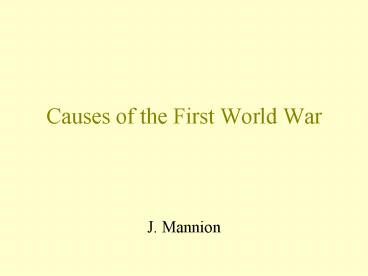Causes of the First World War - PowerPoint PPT Presentation
1 / 20
Title:
Causes of the First World War
Description:
And so we went on, till the big guns had fired their quota ... Japan, honouring a military agreement with Britain, declared war on Germany on 23 August 1914. ... – PowerPoint PPT presentation
Number of Views:39
Avg rating:3.0/5.0
Title: Causes of the First World War
1
Causes of the First World War
- J. Mannion
2
The Arms Race
3
Naval Review 1897
And so we went on, till the big guns had fired
their quota and the Maxims ran out in one last
fiends' flurry, and target-practice for the month
was over. The rock that had been grey was white,
and a few shining cartridge-cases lay beside each
gun. Then the horror of the thing began to soak
into me. What I had seen was a slow peddling-out
of the Admiralty allowance for the month, and it
seemed to me more like squirting death through a
hose than any ordinary gun-practice. What will it
be when all the ammunition-hoists are working,
when the Maxims' water-jacket puffs off in steam
when the three-pounder charges come up a dozen at
a time to be spent twenty to the minute when the
sole limit of four-inch fire is the speed with
which the shells and cases can be handled? What
will it be when the Real Thing is upon
us? Rudyard Kipling
4
The Alliance System
5
The Scramble for Africa
6
German Foreign Policy
7
Wars and rumours of wars
- Russian War With Japan
- Shock Japanese Victory
- Japanese astonish western powers by destroying
the entire Russian fleet at the Battle of
Tsushima (27-28 May 1905) for the loss of two
torpedo boats - a humiliating Russian defeat.
8
Wars and rumours of wars
- The Balkans, 1912 Italy Versus Turkey
- The First Balkan War 1912
- The Second Balkan War 1913
9
Franz Ferdinand
10
Franz Ferdinand
- Heir to Austro-Hungarian Empire in assassinated
in Sarajevo, Bosnia - Serbians implicated
- Austro-Hungary issues ultimatum to Serbia
11
The Blank Cheque
- 1912 110 socialist Reichstag deputies elected
- Germany hopes to avoiding civil unrest via a
short, sharp war. - 6 July 1914 - Germany offers Austria-Hungary "a
blank cheque - an unconditional guarantee of
support in its dealings with Serbia
12
Dominoes
- Austria-Hungary, unsatisfied with Serbia's
response to her ultimatum (which in the event was
almost entirely placatory however her jibbing
over a couple of minor clauses gave
Austria-Hungary her sought-after cue) declared
war on Serbia on 28 July 1914.
13
Dominoes
- Germany, allied to Austria-Hungary by treaty,
viewed the Russian mobilisation as an act of war
against Austria-Hungary, and after scant warning
declared war on Russia on 1 August.
14
Dominoes
- France, bound by treaty to Russia, responded by
announcing war against Germany and, by extension,
on Austria-Hungary on 3 August. Germany promptly
responded by invading neutral Belgium so as to
reach Paris by the shortest possible route.
15
Dominoes
- Russia, bound by treaty to Serbia, announced
mobilisation of its vast army in her defence, a
slow process that would take around six weeks to
complete.
16
Dominoes
- Britain had a only "moral obligation" to defend
France, but declared war against Germany on 4
August. - The main reason for entering the War was to
defend Belgium neutrality under the terms of a
75-year old treaty.
17
Dominoes
Australia, Canada, India, New Zealand and the
Union of South Africa.With Britain's entry into
the war, her colonies and dominions abroad
variously offered military and financial
assistance.
18
Dominoes
- United States President Woodrow Wilson declared a
U.S. policy of absolute neutrality, an official
stance that would last until 1917 when Germany's
policy of unrestricted submarine warfare - which
seriously threatened America's commercial
shipping (which was in any event almost entirely
directed towards the Allies led by Britain and
France) - forced the U.S. to finally enter the
war on 6 April 1917.
19
Dominoes
- Japan, honouring a military agreement with
Britain, declared war on Germany on 23 August
1914. Two days later Austria-Hungary responded
by declaring war on Japan.
20
Dominoes
- Italy, although allied to both Germany and
Austria-Hungary, was able to avoid entering the
fray by citing a clause enabling it to evade its
obligations to both. The following year, in May
1915, she finally joined the conflict by siding
with the Allies against her two former allies.































